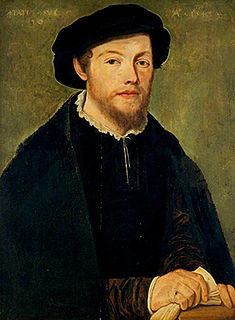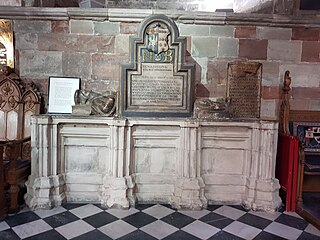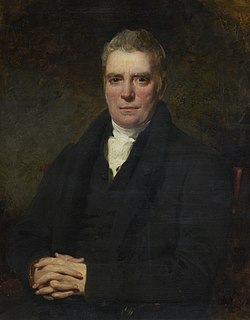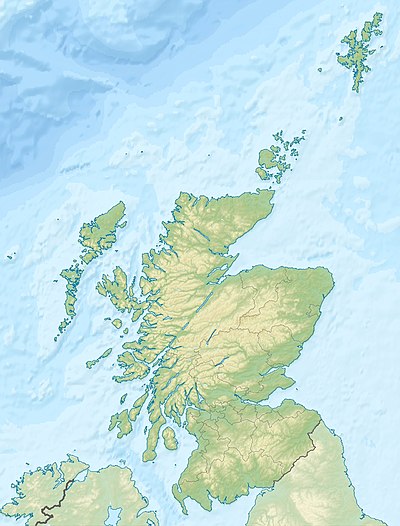
John Welsh was a Scottish Presbyterian leader. He was born in Dumfriesshire and attended the University of Edinburgh to obtain his MA in 1588. He became a minister in Selkirk and married Elizabeth Knox, a daughter of John and Margaret Knox, before leaving Selkirk. Welsh later ministered at Kirkcudbright and Ayr, the latter of which was where he spent five years. His preaching resulted in his imprisonment by the order of King James VI of Scotland. The lawyer Thomas Hamilton wrote to James VI about Welsh, John Forbes, and others; the case was important because many Scottish subjects of James were devoted to the ministers. In 1606 Welsh was exiled to France, where he continued to preach. John Welsh of Ayr was the father of Josias Welsh and the grandfather of John Welsh of Irongray.

George Wishart was a Scottish Protestant Reformer and one of the early Protestant martyrs burned at the stake as a heretic.

Nicholas Bullingham was an English Bishop of Worcester.

John Howie was a Scottish biographer. His best known work was Biographia Scoticana, first published in 1775, which is often called The Scots Worthies. It deals with Christians and particularly Presbyterians especially in their strivings with church and civil authorities.

Thomas M'Crie was a Scottish biographer and ecclesiastical historian, writer, and preacher born in the town of Duns, and educated at the University of Edinburgh. He became the leading minister of the United Secession Church. His Life of Knox (1813) ranks high among biographies for the ability and learning which it displays, and was the means of vindicating the great Reformer from a cloud of prejudice and misunderstanding in which he had been enveloped. It was followed by a Life of Andrew Melville (1819), Knox's successor as the leader of the Reformers in Scotland, also a work of great merit. M'Crie also published histories of the Reformation in Italy and Spain. He received an honorary degree of D.D. in 1813, the first Secession minister, to receive such an award.
Thomas Bentham (1513/14–1579) was a scholar and a Protestant minister. One of the Marian exiles, he returned to England to minister to an underground congregation in London. He was made the first Elizabethan bishop of Coventry and Lichfield, serving from 1560 until his death in 1579.
John Douglas was Archbishop of St. Andrews from 1572 to 1574. As was tradition from the fifteenth to the seventeenth centuries, the Archbishop would take on the role of Chancellor of the University of St Andrews, as the University had strong links with the Pre-Reformation church.

Walter Milne, also recorded as Mill or Myln, was the last Protestant martyr to be burned in Scotland before the Scottish Reformation changed the country from Catholic to Presbyterian.

John Winram was a 16th-century Scottish priest and ecclesiastical reformer. He was born in 1492, the son of one James Winram of Ratho and his wife Margaret Wilkie. He obtained a Bachelor's Degree (1515), a Master's Degree and a Doctorate (1541) from St Leonard's College, University of St Andrews.
Thomas Forret, was vicar of Dollar, Clackmannanshire, and a Scottish martyr.
Robert Pakington was a London merchant and Member of Parliament. He was murdered with a handgun in London in 1536, likely the first such killing in the city. His murder was later interpreted as martyrdom, and recounted in John Foxe's Acts and Monuments. He was the grandfather of Queen Elizabeth I's favourite, Sir John "Lusty" Pakington.
Andrew Simson (c.1526–c.1591) was a Scottish minister and schoolmaster.
Charles Dilly (1739–1807) was an English publisher and bookseller.
Henry Bull was an English Protestant theological writer. He is now remembered as an ally of John Foxe in documenting the Marian exiles and recent religious history.
John Mullins or Molyns was an English churchman and Marian exile, archdeacon of London from 1559.
John Rough was a Protestant martyr and leader of the London underground church. He was born in Scotland and died in England.
John Spottiswood (1510–1585) was a religious reformer in 16th century Scotland.

John Davidson (c.1549–1603) was born in Dunfermline, where his parents owned property in houses and lands. He entered St Leonard's College, St Andrews, in 1567, and after graduating, became a regent of the college, pursuing the study of theology. Being introduced to John Knox, he set himself to advance the cause of the Reformation, and one of his earliest services was the production of a play intended to expose the errors of Romanism, which was acted in Knox's presence. In 1573 there appeared from his pen Ane Breif Commendation of Uprightness, a poem in praise of Knox, with accompanying verses on the Reformer's death. Soon after, another poetical tract was issued anonymously, under the title of Ane Dialog, or Mutitait Talking betwixt a Clerk and ane Courteour, concerning foure Parische Kirks till ane Minister. This was a reflection on the Regent Morton, who had been uniting parishes under one minister to secure part of the benefices for himself. The Regent was deeply offended. Printer and poet were put in prison. On his liberation, he lay hid for a time at Kinzeaneleugh, Ayrshire, the residence of his friend Robert Campbell. He then retired to the Continent, where he remained for about three years. In 1577, at the urgent solicitation of the General Assembly, Morton permitted his return, and in 1579 he became minister of Liberton. In June 1581, Morton being under sentence of death was visited by Davidson. Going for a time to London, he became known at the English Court, and from the earnest style of his preaching was called the thunderer. Returning, he did not resume his charge at Liberton, but officiated in various places. and acted as minister of the Second Charge of Holyrood. In 1595 he became minister Prestonpans, and built a church and manse at his own expense. He vigorously resented the proposal that certain of the clergy should sit and vote in Parliament, and words that he then uttered were often repeated : "Busk him, busk him as bonnily as ye can, and bring him in as fairly as ye will, we see him well eneuch, we see the horns of his mitre." He was summoned before King James at Holyrood, and committed to Edinburgh Castle, but released, and allowed to return home, though interdicted from going beyond the bounds of his parish. He died in September 1604.









